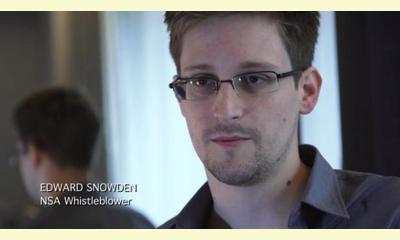|
|
Interview with Edward Snowden: The Latest Whistleblower
un articulo por David Adams
Video: Edward Snowden interview
Back in 2004, when Yoko Ono awarded the LennonOno
Peace Prize to two "whistleblowers" including
Mordechai Vanunu who blew the whistle on Israeli
nuclear weapons, CPNN carried the following discussion comment: "As
the amount of government secrecy continues to
increase, we may expect that the number of
whistle-blowers will also tend to increase in the
years to come."

click on photo to enlarge
This prediction seems to be coming true. Last
year we had Bradley Manning and Julian
Assange. And now this year, Edward Snowden,
who has revealed the extent that the United States
government is now spying on its own citizens .
Here are some excerpts from his recent interview
with the Guardian.
Guardian question: Why did you decide to become a
whistleblower?
Snowden: "The NSA has built an infrastructure that
allows it to intercept almost everything. With
this capability, the vast majority of human
communications are automatically ingested without
targeting. If I wanted to see your emails or your
wife's phone, all I have to do is use intercepts.
I can get your emails, passwords, phone records,
credit cards.
"I don't want to live in a society that does these
sort of things … I do not want to live in a world
where everything I do and say is recorded. That is
not something I am willing to support or live under"
. . .
Guardian question: What do the leaked documents
reveal?
Snowden: "That the NSA routinely lies in response
to congressional inquiries about the scope of
surveillance in America. I believe that when
[senator Ron] Wyden and [senator Mark] Udall asked
about the scale of this, they [the NSA] said it
did not have the tools to provide an answer. We do
have the tools and I have maps showing where
people have been scrutinised most. We collect more
digital communications from America than we do
from the Russians."
Guardian question: What about the Obama
administration's protests about hacking by China?
Snowden: "We hack everyone everywhere. We like to
make a distinction between us and the others. But we
are in almost every country in the world. We are not
at war with these countries" . . .
Guardian question: Does your family know you are
planning this?
Snowden: "No. My family does not know what is
happening … My primary fear is that they will come
after my family, my friends, my partner. Anyone I
have a relationship with …
I will have to live with that for the rest of my
life. I am not going to be able to communicate
with them. They [the authorities] will act
aggressively against anyone who has known me. That
keeps me up at night" . . .
Guardian question: How to you feel now, almost a
week after the first leak?
Snowden: "I think the sense of outrage that has
been expressed is justified. It has given me hope
that, no matter what happens to me, the outcome
will be positive for America. I do not expect to
see home again, though that is what I want."
|








|
DISCUSSION
Pregunta(s) relacionada(s) al artículo :
The courage of Mordecai Vanunu and other whistle-blowers, How can we emulate it in our lives?
* * * * *
Comentario más reciente:
:
Whistle-blowers may be considered as very important actors for a culture of peace. As described on the CPNN page for values, attitudes and actions for a culture of peace, the culture of war is characterized by propaganda, secrecy, government control of media, militaristic language and censorship while the culture of peace is characterized by the free flow and sharing of information. Whistle-blowers break the back of secrecy directly and dramatically.
Mordecai Vanunu's courage continues the tradition of Daniel Ellsberg, who made known the Pentagon Papers during the Vietnam War and Karen Silkwood, who exposed nuclear pollution in the United States. Ellsberg was persecuted by President Nixon and Karen Silkwood was murdered, as described some years ago in a very fine film starring Meryl Streep.
As the amount of government secrecy continues to increase, we may expect that the number of whistle-blowers will also tend to increase in the years to come.

|
|









